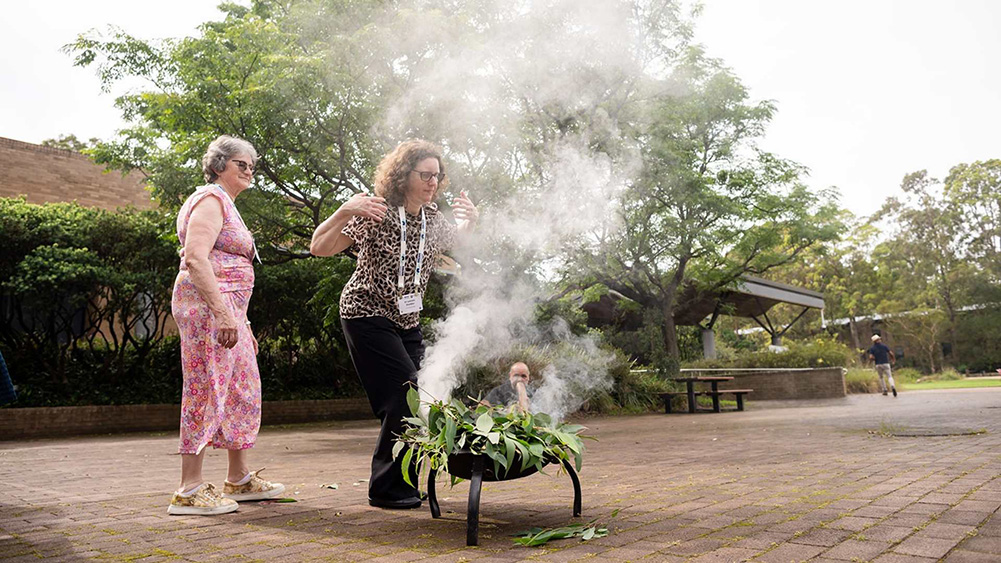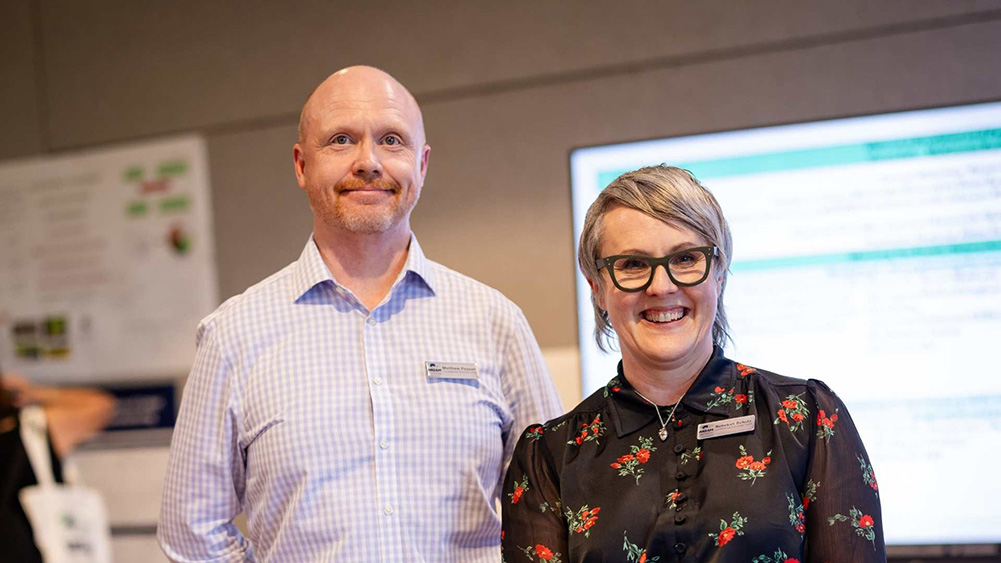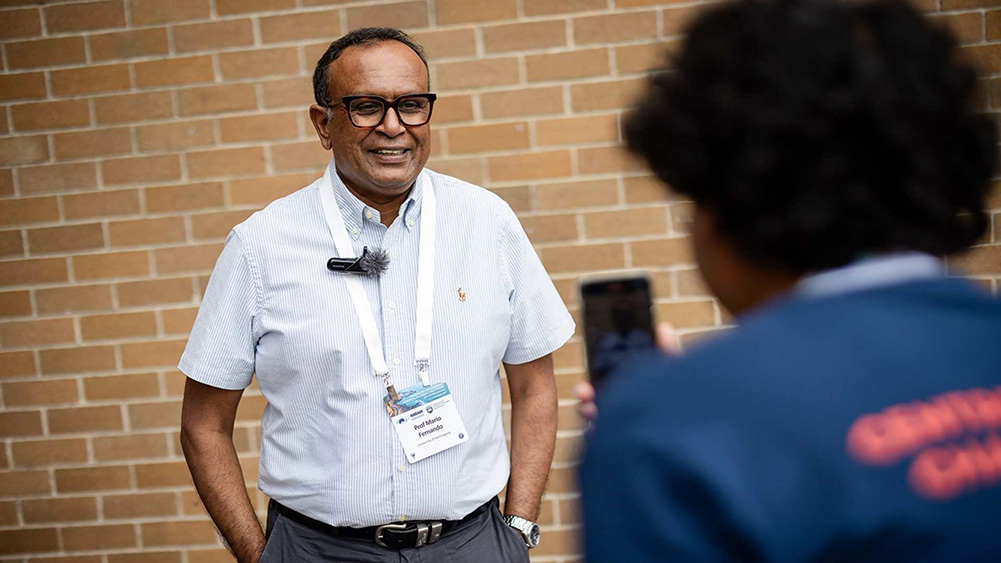December 5, 2024
Management with meaning - not the trappings of tradition
UOWs School of Business collaborated with the Australian and New Zealand Academy of Management to disrupt traditional management thinking, daring leaders to rethink how meaningful management can transform organisations and society
The School of Business, chaired by Professor Matt Pepper and Dr Rebekah Schulz, hosted the 37th Australian and New Zealand Academy of Management (ANZAM) Conference from 3 to 5 December, 2024. Over 360 academics, industry partners and practitioners from 31 countries gathered at UOW. Together, they challenged traditional assumptions of management and leadership theory. In 1977, Audre Lorde (2020, p.49) warned of the dangers of mistaking “the trappings of success in a sick society for the signs of a meaningful life”. Almost fifty years on, Lorde’s critique remains relevant in contemporary organisations where performative leadership for example, continues to overshadow genuine attempts at creating sustainable businesses and equitable practices for employees from diverse backgrounds. Inspired by Lorde’s call to challenge the traditional trappings of success, the conference took steps to explore what meaningful management can look like in a complex, diverse world. This Conference was not a forum for polite dialogue, but a genuine effort to challenge the status quo, taking Lorde’s warning as a call to action, for the benefit of employees, organisations and wider society.
Drawing upon UOW's commitment to addressing complex, real-world problems, the conference chairs invited scholars with heterogeneous perspectives, including First Nations, gendered, and culturally diverse viewpoints, to engage in an interdisciplinary dialectic on management research, teaching, and practice.
The theme of the conference, “Celebrating management research, its impact and future”, provoked academics and practitioners to confront today’s organisational challenges by critically examining the past, questioning embedded assumptions and reimagining what meaningful management could look like.
Brendan Moyle, a proud Kamilaroi/Gomeroi man and Executive Branch Manager for the Office of Aboriginal and Torres Strait Islander Affairs, offered a candid and pragmatic examination of reconciliation in Australia. In the wake of the 2023 Indigenous Voice to Parliament referendum, Brendan explored what reconciliation now means and the collective responsibilities of individuals and organisations.
Brendan challenged managers, practitioners, and researchers to critically reflect on their roles in the reconciliation process. His talk underscored the need for reconciliation to move beyond symbolism and tokenistic gestures that often do not work; instead emphasising tangible, collective, community-driven actions and incremental steps towards addressing systemic inequities. Brendan urged attendees to consider how management research and leadership practice can actively contribute to building trust, healing race relations, and fostering sustainable outcomes for First Nations peoples.
Brendan’s perspective brought an essential voice to the conference, reminding participants that reconciliation is not just an abstract concept but a collective responsibility—one that demands honesty, accountability, and ongoing engagement.
The conference opened with a heartfelt Welcome to Country and Smoking Ceremony led by local Elders Aunty Barb Nicholson and Uncle Peter Button, who shared the cultural and spiritual significance of these ceremonies. The outdoor setting for the ceremony was intentional and significant, connecting delegates to Country and allowing them to experience the ceremony as it was meant to be—in harmony with the land that has long been cared for by First Nations peoples. For many delegates—local, national, and international—this was an opportunity to confront Australia’s distressing past, recognise the ongoing impacts of colonisation, and reflect on our individual and collective responsibility to reduce inequalities. Brendan this sentiment, reminding participants that “Reconciliation, like change, starts with the small things. It starts with personal commitment and relationships.” This reflection and demonstration of respect continued throughout the conference, with presenters and facilitators encouraged to share their own connections to Country, building on the work of the Indigenous Strategy Unit in the conscientisation of the University and its business.
 Dr Lynnaire Sheridan, University of Otago, Conference Delegate, Smoking ceremony at the ANZAM Conference 2024
Dr Lynnaire Sheridan, University of Otago, Conference Delegate, Smoking ceremony at the ANZAM Conference 2024
Holding these events outdoors amplified their impact, grounding participants in the importance of place and allowing them to witness the deep spiritual and cultural connections First Nations peoples have with the land. These small but significant steps raised awareness and consciousness among participants, aligning with Brendan Moyle’s call for reconciliation that is honest, actionable, and grounded in respect for First Nations peoples.
Equity was not just discussed but actively practised. Co-chairs Pepper and Schulz embodied this principle through male and female co-leadership, while session chairs reflected gender balance and representation of city and regional academics. HDR students played an active role in the conference, creating video blogs to capture delegate perspectives and document key insights. This initiative provided PhD and Master’s students with invaluable opportunities to network with experienced academics, gain exposure to diverse research ideas, and actively participate in knowledge exchange.
 Professor Matt Pepper and Dr Rebekah Schulz, Co-Chairs, ANZAM Conference 2024
Professor Matt Pepper and Dr Rebekah Schulz, Co-Chairs, ANZAM Conference 2024
As a result of these and other strategies implemented throughout the conference, many delegates left with a renewed resolve to embed First Nations wisdom and perspectives into their research portfolios, teaching practices, and institutional policies. This restored commitment reflected the conference's broader goal: to move beyond the “trappings of success” and instead pursue meaningful actions that challenge embedded inequities. By facilitating honest dialogue, establishing space for underrepresented voices, and taking tangible steps toward reconciliation, UOW and ANZAM demonstrated how academia can be a force for genuine societal transformation. The 37th ANZAM Conference was a clear reminder that leadership and management—when rooted in equity, accountability, and community—can redefine success and set a new course for organisations and society.
Lorde, A 2020. The Selected Works of Audre Lorde, 1st ed., New York, W. W. Norton & Company, Incorporated.
 Professor Mario Fernando, UOW being interviewed by School of Business student, Shamimul Rayhan
Professor Mario Fernando, UOW being interviewed by School of Business student, Shamimul Rayhan
:format(jpg)/prod01/channel_3/assets/contributed/faculty-of-business-and-law/news-images/ANZAM-Conference-2024-photos-1-499X281.jpg)